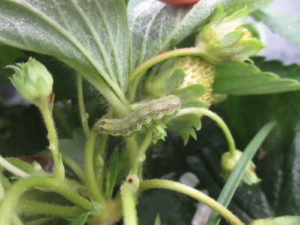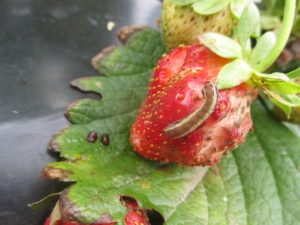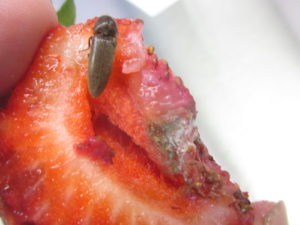At the Southwest Purdue Ag Center, we are studying annual strawberry production on plastic mulch. Our hope is to gather information for best production practices in our area. As we learn about insect and disease problems, we will pass this information on to producers. This article is about the insect pests we have observed in our strawberries that were planted in March 2019.
Armyworm– Toward the end of the spring harvest, we observed significant damage on strawberry fruit caused by armyworms. Beet armyworm and yellowstriped armyworm larvae were found in the field (Figure 1 and 2). They feed on both green and ripe strawberries. More than 30% fruit became unmarketable because of the insect feeding. Damage was also observed on flowers.
Armyworms also cause significant damage when they chew on strawberry crowns and leaves of summer-planted young strawberry plants. Midwest Fruit Pest Management Guide provides several options for controlling the pest. For organic growers, Bt products can be used to control armyworms if larvae are young and populations are not too large. Spinosad, another biologically derived pesticide is also effective against young larvae.
Thrips– Thrips feed on strawberry flowers, causing leathery fruit that fail to ripen evenly. Thrips damage was observed earlier in the harvest. Although it did not reach the threshold of 10 thrips per blossom. The damage became more severe as the season moved forward. More information about this pest and the control can be found in Rick’s article Eastern Flower Thrips in Strawberries in previous issue of Facts for Fancy Fruit newsletter.
Click beetle– Click beetle is the adult stage of wireworms. It is not a major pest of strawberries. But the adult can cause damage on ripe strawberry fruit (Figure 3). The damage was relatively minor in the field.


